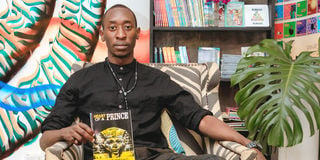Franz Owano: If only more authors debunked the stigma around mental health...

Author Franz Owano.
Franz Owano is a medical doctor, a lover of the arts and a publisher. He is an artiste keen on challenging the constraints of convention and describes himself as “a rebel without a cause”. “I am a walking bag of contradictions and a boy from Kisumu with a dream,” he says during a conversation with Life&Style about his writing and reading.
Owano, a playwright, novelist and short story writer, has written nine books. His books tackle self-discovery, spiritual conflict, mental health, and loss. His plays include A Silent Epiphany (2020), Banda’s War (2020), Kenyan Man vs Woman (2020), Chasing after Unicorns (2020) and The Trials of Chepondo (2020). His short stories are The Chief Must Die (2021), All the Old Gods (2022) and By Their Fruits (2023). He has also published a historical fiction novel Heart of a Prince (2022) and a novella Dreams of Better Days (2020).
What is your writing process like?
I believe routine and structure are essential to the writing process and override writer’s block. I liken writing to a muscle. The more it is exercised, the more unconscious memory develops. My writing process begins with a morning run. After sprucing up, I read on a broad array of topics. As a rule, I write no more than five pages a day with a thirty-minute break between each page for research. Being an early riser, I prefer writing in the morning. The wee hours are tranquil and in them, I find myself most productive. I keep notebooks where I scribble my ideas. Questions into the sense of humanity, our beliefs, morality, and ideals inspire my writing.
What is your publishing experience like?
As an author, publishing was initially wrought with constant rejection, lingering disappointment and residual self-doubt. When I parted ways with traditional publishing, I chose to stay true to my vision by seeking a new path, self-publishing.
Why do you prefer self-publishing to traditional publishing?
On several occasions, I was uncomfortable with the creative direction taken. In many ways, my input and concerns weren’t acknowledged. Self-publishing has allowed me to explore the depths of my craft without encumbrance. This, coupled with the exclusive control of my intellectual property, has made it an attractive prospect.
What is the best feedback you have ever received from readers of your books?
On completing Banda’s War, a play tackling spiritual conflict and the nature of redemption, which I penned in my youth, a reader who happened to be an avowed agnostic with an adventurous past reached out. He informed me that it was a deeply probing insight into the nature of man; that it impelled him to re-evaluate his relationship with a higher power in the hopes that his capacity for judgment would be matched only by his capacity for forgiveness.
Describe your ideal reading experience.
I prefer reading in the morning while newly restored from slumber and full of zest. On completion of every twenty pages of material, I take a ten-minute break during which I scribble notes on the side and underline the salient points with a pen; a habit that has made family and friends hesitant to share hard-copy books with me. I hereby apologise profusely to those I have offended.
Which writers today do you admire most?
Locally, Jackson Biko and Yvonne Adhiambo Owuor have been great inspirations. Regionally, Chimamanda Ngozi Adichie, NoViolet Bulawayo, and Jennifer Nansubuga Makumbi deserve an honourable mention. Internationally, Isabel Allende, David Mitchel and Haruki Murakami come to mind.
What’s the most interesting thing you’ve learned from a book recently?
In the Wisdom of Insecurity by Alan W. Watts, he asserted that if we cling to the belief in God, we cannot likewise have faith, since faith is not clinging but letting go. As a believer, I found the assertion thought-provoking.
Which subjects do you wish more authors would write about?
I wish more authors debunked the stigma accompanying mental health among African men and tackled the nomadic woman’s place in society.
How has your reading taste changed over time?
I have adopted a more clinical approach over the years. I read with the intention of learning rather than the pursuit of leisure. I have thus stocked my library with an increasing number of non-fiction material, memoirs and biographies by notable historical figures, and texts on financial literacy.
Do you remember the last book you put down without finishing? Why did you put it down?
Vanity Fair by William Thackeray. Work engagements proved insurmountable, precluding its completion.
What books are you embarrassed not to have read yet?
The Brothers Karamazov by Fyodor Dostoyevsky, The Gathering Storm by Winston Churchill and Ghosts of Empire by Kwasi Kwarteng, just to mention a few.
What do you plan to read next?
Yvonne Adhiambo Owuor’s TheDragonfly Sea.
***
Do you have feedback on this article? Please e-mail: [email protected]




